|
|
|
Sort Order |
|
|
|
Items / Page
|
|
|
|
|
|
|
| Srl | Item |
| 1 |
ID:
128476
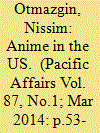

|
|
|
|
|
| Publication |
2014.
|
| Summary/Abstract |
In the past two decades, the enthusiastic global reception of Japanese cultural exports has drawn wide academic attention. In the case of Japanese animation ("anime"), its penetration into the United States, the world's biggest media market, has been described as owing greatly to the crucial role of fans as cultural agents, the deterritorializing effects of globalization, the domestication and heavy editing of anime to suit local tastes, and being part of the wider global flow of Japanese pop culture and "soft power." Drawing on interviews with Japanese and American key personnel in the anime industry, field research and market surveys, this paper focuses on the organizational aspect of the anime market in the United States since the mid-1990s, with particular attention to the role of entrepreneurs, who are imperative for bridging organizational rigidities and cultural differences in global markets. The central argument presented is that entrepreneurship is a central feature in the process of transnational penetration, distribution, reproduction and consumption of cultural commodities and genres, which produce ever more complex and disjunctive economic, cultural and political orders.
|
|
|
|
|
|
|
|
|
|
|
|
|
|
|
|
| 2 |
ID:
128473
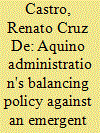

|
|
|
|
|
| Publication |
2014.
|
| Summary/Abstract |
This article examines why and how small powers balance big powers. One such small power is the Philippines, which-despite its military weakness- applies a balancing policy on an emergent China relative to the South China Sea imbroglio. Largely, this balancing policy is the upshot of three developments: a) the present Aquino Administration's efforts to disassociate itself from the previous Arroyo Administration's policy of equi-balancing China and the U.S.; b) China's heavy-handed behavior in the South China Sea dispute; and c) the willingness of the U.S. to assist the Philippines in constraining an assertive China. In conclusion, the article offers two reasons why this balancing policy is risky and difficult. First, the Philippines needs time and resources to develop the military capability to back its territorial claim in the South China Sea; and second, the U.S., though supportive of the Philippine position, is wary of triggering a full-blown geo-strategic rivalry with China.
|
|
|
|
|
|
|
|
|
|
|
|
|
|
|
|
| 3 |
ID:
128478
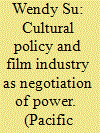

|
|
|
|
|
| Publication |
2014.
|
| Summary/Abstract |
This article explores the global-local interplay by analyzing the changing role of the Chinese state and its evolving cultural policy during its engagement with global Hollywood from 1994 to 2012. It further investigates the impact of the state policy on the formation of a domestic film industry. Drawing on both English and Chinese language sources and combining both primary and secondary empirical data, the article examines local strategies and resistance toward global Hollywood, and argues for the Chinese state's adaptive and negotiation capability that serves to reverse the power relationship in international communication. The state employs a strategy of taking advantage of Hollywood resources to build the domestic film industry in order to promote Chinese soft power. Therefore, by weaving both market forces and global capital into the state mechanism, the Chinese state effectively reinforces its authoritarian power.
|
|
|
|
|
|
|
|
|
|
|
|
|
|
|
|
| 4 |
ID:
128475
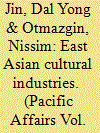

|
|
|
|
|
| Publication |
2014.
|
| Summary/Abstract |
This special section is to explore several key issues related to the development in three of the biggest East Asian cultural industries, namely in China, Japan, and South Korea. It addresses a few important dimensions of change that merit analysis-the emergence of East Asian cultural industries in terms of growths in scale and exports; the transnationalization of production and distribution; the relaxation of foreign ownership restraints; and changing relations between the cultural industries and the state. The attempt is to conceptualize the relations between the cultural industries and cultural policy; draw insights from critical media studies and cultural policy studies; and explore what it means for policy-makers when culture and creativity move from the margins to the center of economic activity.
|
|
|
|
|
|
|
|
|
|
|
|
|
|
|
|
| 5 |
ID:
128474
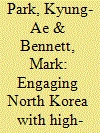

|
|
|
|
|
| Publication |
2014.
|
| Summary/Abstract |
As articulated by Joseph Nye, soft power is the ability to achieve goals through attraction rather than by threat or conflict. Although frequently associated with the state and foreign policy, non-state actors can also develop and possess soft power independent of the state. In particular, educational institutions have long held significant amounts of soft power that transcend national boundaries. Through knowledge sharing, educational institutions can leverage soft power to influence a society through educating its social and political elites, and future leaders.
Knowledge sharing that focuses on human resource development is one of the most successful areas of cooperation between North Korea and the international community. Knowledge sharing activities not only give North Korean participants access to knowledge but this access contains an important potential for socialization effects - the spreading of ideas, customs and values. Despite this, however, the current body of literature on knowledge sharing is quite limited.
Based on the on-going knowledge sharing experiences with North Korea at the University of British Columbia, this paper explores the nature and the development of knowledge sharing with Pyongyang, demonstrating that North Korea can be a 'willing interpreter and receiver' of soft power. Using the concept of university soft power, the paper proposes that educational institutions are inherently effective in using their influence and expertise to initiate successful, long-term knowledge sharing with North Korea. It will also examine strategies for successful knowledge sharing with Pyongyang and the impacts of such knowledge sharing with relation to engagement efforts with North Korea.
|
|
|
|
|
|
|
|
|
|
|
|
|
|
|
|
| 6 |
ID:
128477
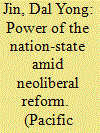

|
|
|
|
|
| Publication |
2014.
|
| Summary/Abstract |
This paper investigates the changing role of the nation-state in the context of the broader social structure of society amid neoliberal globalization with a focus on the politics of the Korean Wave. It analyzes the ways in which the Korean government has developed its unique cultural policy and how it has contributed to the growth in Korean cultural production and export. The paper argues that neoliberal ideologies have not completely altered the role of the nation-state in the Korean Wave in spite of the dominance of neoliberal ideology in Korea's economic conduct.
|
|
|
|
|
|
|
|
|
|
|
|
|
|
|
|
|
|
|
|
|